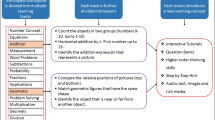Abstract
Recent research has suggested that standardized high-stakes tests, such as the SAT, have become increasingly important to policy makers, school districts, and society in general. Scoring well on these tests may determine the access to educational opportunities beyond high school. Unfortunately, recent reports have shown that Americans are falling behind their peers in other nations on comparable assessments (Gollub et al., 2002). Additionally, schools in the U.S. must adhere to the demands of the No Child Left Behind Act (NCLB). The policy states that federal district funding is dependent on student overall performance on standardized tests in mathematics, reading and other content areas. To alleviate the problem of U.S. students underachieving on standardized tests, educators must explore areas of pedagogy that have been empirically shown to be effective.
Access this chapter
Tax calculation will be finalised at checkout
Purchases are for personal use only
Preview
Unable to display preview. Download preview PDF.
Similar content being viewed by others
Author information
Authors and Affiliations
Editor information
Editors and Affiliations
Rights and permissions
Copyright information
© 2013 Springer-Verlag Berlin Heidelberg
About this chapter
Cite this chapter
Sullins, J., Meister, R., Craig, S.D., Wilson, W.M., Bargagliotti, A., Hu, X. (2013). The Impact of a Mathematical Intelligent Tutoring System on Students’ Performance on Standardized High-Stake Tests. In: Falmagne, JC., Albert, D., Doble, C., Eppstein, D., Hu, X. (eds) Knowledge Spaces. Springer, Berlin, Heidelberg. https://doi.org/10.1007/978-3-642-35329-1_4
Download citation
DOI: https://doi.org/10.1007/978-3-642-35329-1_4
Published:
Publisher Name: Springer, Berlin, Heidelberg
Print ISBN: 978-3-642-35328-4
Online ISBN: 978-3-642-35329-1
eBook Packages: Mathematics and StatisticsMathematics and Statistics (R0)




